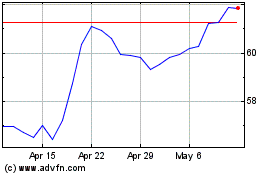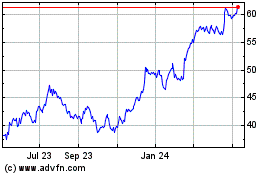By Ezequiel Minaya, Tatyana Shumsky and Nina Trentmann
Corporate finance leaders are worried that the good times won't
last as an increasingly cloudy long-term economic outlook plays out
against the backdrop of trade spats and geopolitical risk.
The passage of the U.S. tax overhaul eliminated significant
uncertainty and strengthened earnings for many companies. Economic
data from Washington to Beijing has been strong as global growth is
estimated to climb to 3.9% this year, according to the
International Monetary Fund. Capital spending by companies in the
S&P 500 rose about 24% to $166 billion during the first three
months of the year compared with 2017, according to Credit Suisse
Group AG data.
"That's a very business friendly environment to be operating in,
better than in the recent past," said John Shrewsberry, Wells Fargo
& Co.'s finance chief.
Longer-term forecasts are less optimistic. The IMF warns that
the boost from the U.S. tax cuts will fade beginning in 2019.
Economists surveyed by The Wall Street Journal worry that a
recession could begin in 2020 as the Federal Reserve raises
interest rates.
Some CFOs say a downturn appears overdue, amid signs of
tightening credit and labor markets. And the specters of trade
tensions and political turmoil from Mexico to London to Washington
are haunting even the rosiest of company outlooks.
The widely cited Global Economic Policy Uncertainty Index surged
64% between January and May, reaching its highest level in a year
even as the capital spending boom got under way.
Nick Bloom, an economics professor at Stanford University and an
author of the index, attributed the surge to U.S. President Donald
Trump's tougher stance on trade, saying the leader "means business
in introducing tariffs and pulling away" from the Group of Seven
industrialized nations.
The White House is levying tariffs on tens of billions of
dollars of Chinese goods starting in July, a move that is likely to
spark retaliation from China. The Trump administration also is
seeking to rewrite the North American Free Trade Agreement with
Canada and Mexico.
The trade conflicts have given businesses pause, said Mark
Zandi, chief economist at Moody's Analytics. He said companies are
clearly increasing capital outlays, but he believes the investment
growth would be greater without the trade tensions.
"I think that it is having an impact on investment decisions and
hiring decisions," Mr. Zandi said. "Businesses are not pulling
back. But they are not fully engaging. Investment spending growth
is good. But I think it would be even stronger if not for this
cloud created by these trade tensions."
The uncertainty surrounding tariffs and trade both in the U.S.
and globally has forced Donald Allan, chief financial officer at
tool maker Stanley Black & Decker Inc., to double the amount of
time he spends on contingency planning.
"I'm spending at least 40% of my time on that type of stuff, if
not more, " Mr. Allan said, adding that he frequently consults a
variety of external experts from investment bankers to lobbyists to
industry associations to get a range of perspectives.
The goal is to make sure "that we're effectively managing all of
the risks but also making sure that we're not overreacting," Mr.
Allan said.
For Verizon Communications Inc., the concern tied to trade
friction was any possible impact it could have on the company's
supply chain, said CFO Matthew Ellis. The scope of any disruption
is likely to be limited as the telecommunications giant is focused
on the U.S., though the company imports some networking equipment
from overseas.
"You do your best to make sure you have contingency plans," he
said. "You think through, 'Am I solely reliant on one particular
supplier, one outcome?'"
Other companies also are bracing for a potential decline in
economic sentiment. Discovery Inc., the New York-based media and TV
company, plans to have money on hand now that it completed the
acquisition of Scripps Networks Interactive Inc. in March. "The new
Discovery is a free cash flow machine," CFO Gunnar Wiedenfels said
Wednesday. He forecasts that cash left over from operations,
including capital spending, will reach $2.3 billion this year.
"Having free cash flow in these times of uncertainty gives us a
lot of flexibility," Mr. Wiedenfels said.
Mr. Trump's high-profile talks with North Korea, the unfolding
impact of Britain's exit from the European Union, and turmoil in
the Middle East and Venezuela, are among the additional
geopolitical stresses demanding the attention of finance
chiefs.
Amid this backdrop, according to Gregory Daco, chief U.S.
economist at Oxford Economics, companies have the more predictable
concern of an economy that is "fairly advanced in a business
cycle."
CFOs are increasingly wary of rising costs associated with
putting out a product or service -- such as labor, transportation
and energy, he said.
"Until the dust settles, people just definitely have to stand
back and wait for that to happen," said Wells Fargo's Mr.
Shrewsberry.
Write to Ezequiel Minaya at ezequiel.minaya@wsj.com, Tatyana
Shumsky at tatyana.shumsky@wsj.com and Nina Trentmann at
Nina.Trentmann@wsj.com
(END) Dow Jones Newswires
June 17, 2018 05:44 ET (09:44 GMT)
Copyright (c) 2018 Dow Jones & Company, Inc.
Wells Fargo (NYSE:WFC)
Historical Stock Chart
From Mar 2024 to Apr 2024

Wells Fargo (NYSE:WFC)
Historical Stock Chart
From Apr 2023 to Apr 2024
